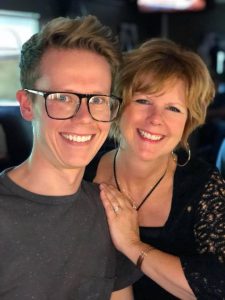by Kelly Beischel PhD, RN, CNE, CAPP, CPPC
I shared the following post on Facebook last Friday. Why? As a means to shower love onto my son who chose to live on September 7th, 2005.
I also shared it because it’s become important to me to disrupt the idea that we have to keep our messy lives undercover.
You and I know that none of us live the kind of life that Instagram and Facebook stories would like you to believe. Right?
Here’s the post followed by additional lessons I learned:

It was 13 years ago today that:
- My life changed irrevocably, for the better,
- Our family became an impenetrable force,
- I learned bullying paired with perfectionism could be deadly,
- I learned without. a. doubt. that #loveconquersall
- And expressing your love daily can save a life
It was 13 years ago today that Luke took the shotgun out of his mouth and chose life instead.
Thank you for choosing us.
Thank you for changing us.
Thank you for loving us.
❤️❤️❤️
Learning, the day after the “incident”, as we so fondly call it, that Luke’s love for us and our love for him compelled him to put the gun down and call us was the most important lesson of all. That’s when #loveconquersall became my mantra.
This is NOT to say a person doesn’t love his family when he chooses to die by suicide. It means that his pain was so deep that he couldn’t see past it.
I learned many other important lessons from this time in our lives:
- It can be difficult for a person who feels like a failure after failing a test to come home then and relive his failure by telling his parents he failed. The re-telling of the failing score reinforces the feeling that “I’m a failure.” Perhaps this is why students have difficulty coming to office hours. It’s easier to pretend it didn’t happen.
- Know your child’s limits – ask him his threshold – what exam score leads him to spiral? And then monitor for scores below his threshold.
- We all have breaking points. Some people hide their breaking points better than others. Unfortunately, when we hide our breaking points, people can’t come forward to help us.
- Things aren’t always as they seem. Keeping tabs on your child’s emotional state and how it manifests is clutch. They can be great actors.
- Hug your child and ask him about his day – every day. Yes, even when it feels like you’re wrapping your arms around an unwelcoming porcupine when you hug him.
- When tragedy, even near tragedy, strikes, talk openly about your feelings – and then process, process, process.
- Look for the lessons – ask yourself what you’re supposed to learn from what life has handed you.
- When your child talks about stressful issues, ask him what he needs. Is he asking for you listen while he vents, or does he need help solving the issue? Being a premature e-solvulator isn’t helpful to a person who just wants to be heard. Be there to listen.
- And if two days after your son’s suicide attempt, you hit a chipmunk in the road and break down crying while taking your younger son to school, pull off to the side of the road and let it flow. You’ll feel better for it.
There are lessons in every situation we experience. Finding these lessons propels us forward.
Luke learned that there is always hope. (Go here to hear Luke tell his story of hope.)
What’s one lesson you can find in a trying experience? An experience that’s distressing, or has you doubting yourself, or even one that’s brought you to your knees?
It might be that failing something doesn’t mean that you’re a failure. Perhaps your strategy didn’t work, or perhaps you need to use a new strategy. It might be that evaluations are important but perhaps eliminating the best two comments, and the two worst comments will give you a truer picture of your performance. It might be that you need to listen to your gut because it was trying to move you in the right direction, but you wouldn’t listen.
Latch onto these lessons. Use them as your catalyst for moving forward.
You’ll be stronger than you ever knew you could be.
Lots of love to you and yours,


Comments
Add Comment